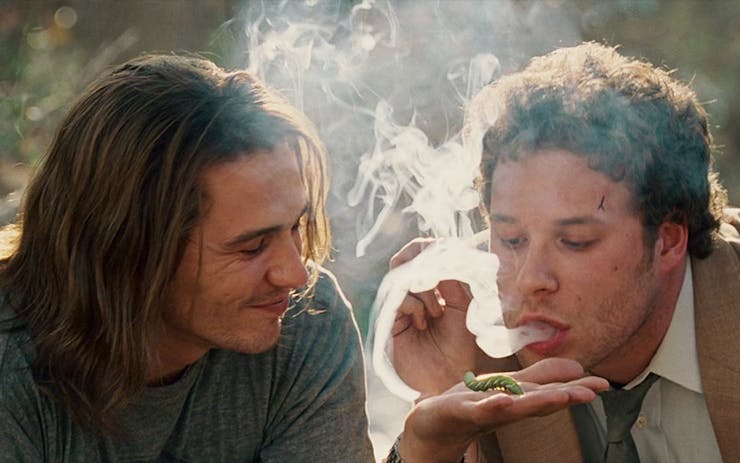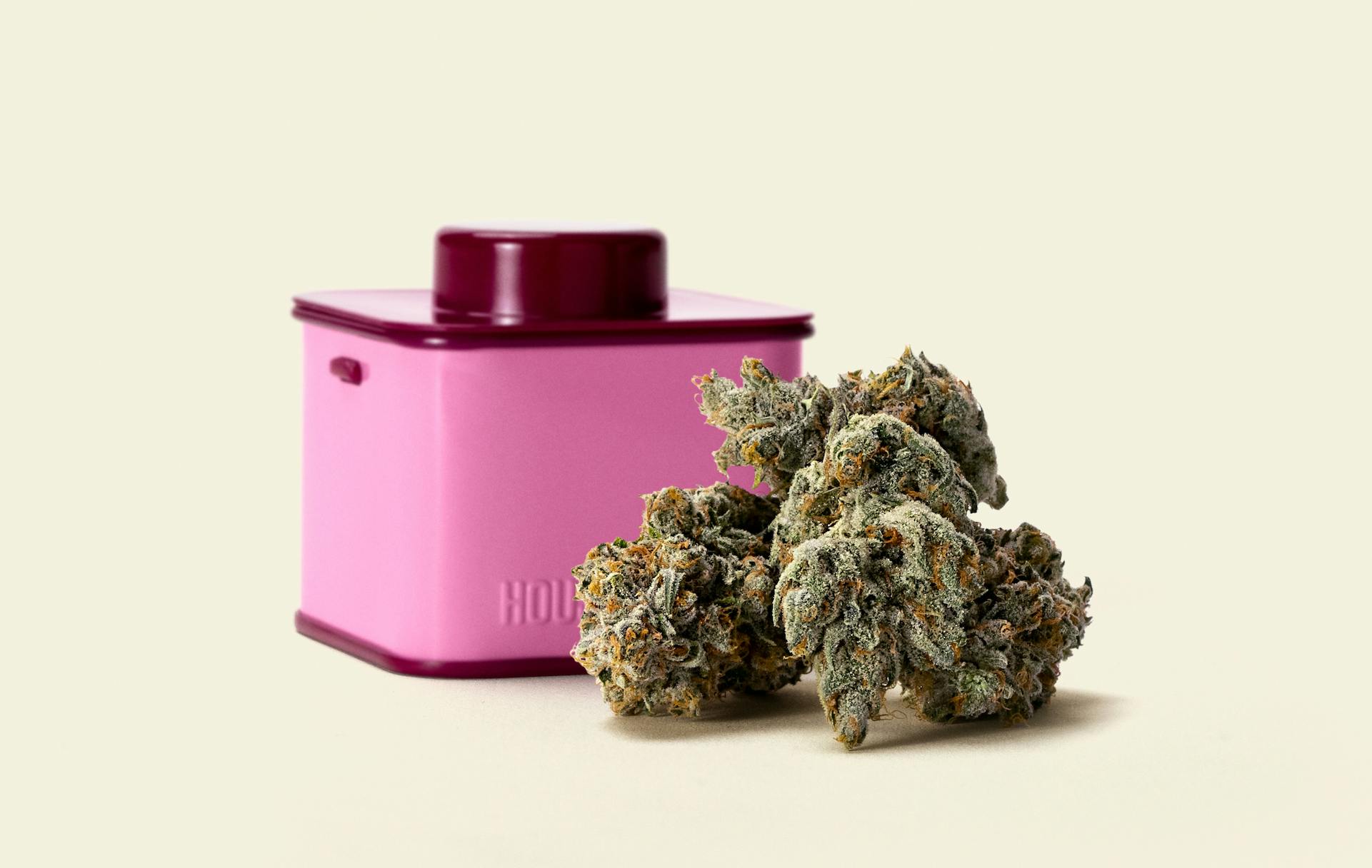With legalization taking the novelty out of getting baked, stoner comedy just doesn’t hit the same as it used to.
In the opening scene of Seth Rogen’s 2007 magnum opus, Pineapple Express, his character Dale Denton is on the phone, smoking a joint while driving. “If marijuana is not legal within the next five years, I have no faith left in humanity, period. Everyone likes smoking weed. They have for thousands of years, they aren’t going to stop anytime soon.”
Five years later, Colorado and Washington led the pack in legalizing adult-use cannabis. Rogen now has his own weed company, plus dozens more projects under his belt. And federal legalization seems just as inevitable as Dale Denton said in 2007.
People aren’t just smoking more weed than ever, they’re also talking about weed without the typical old taboos. Normalization means more representation for cannabis lovers, but it also means some elements of pot culture are being watered down for mainstream tastes.
2022 releases like Good Mourning, starring Colson Baker (Machine Gun Kelly), Megan Fox, Pete Davidson, and pot influencer Boo Johnson, lean on weed as a plot device. But the rom-com doesn’t quite hit like Half Baked or How High over two decades after those films took the real creative risks.
Broad City and High Maintenance, two of the very best shows portraying the elevated life, feel at odds with a New York City where you can now smoke weed wherever you can a Pall Mall.
Even the latest installment of the Clerks comedy series jokes that parking lot pot idols Jay and Silent Bob haven’t actually been cool since the 90s in a new trailer.
As a San Franciscan born in ‘95, most of my sentient life has happened within the context of legal weed. Prop 215 was passed thanks to activists in my hometown, and I entered the industry at 20. So I’ve seen a lot of weed comedy, heard a lot of pot-informed jokes, and consumed more than my fair share of weedia (that’s weed media). Even that painfully turgid Kathy Bates dispensary show. If it’s about weed, I’m watching. But with few exceptions, canna-comedy often feels like it’s hit a ceiling.
The circumstances for films like Pineapple Express or Up In Smoke simply don’t exist anymore. Abby and Ilana fighting cardboard cut-outs and talking to figs no longer stand out when I smell weed all over Brooklyn. Perhaps, those films’ and shows’ creators helped destigmatize weed so well that it’s no longer an interesting plot device. The drama, suspense and hi-jinks of Spicoli showing up to class blazed in Fast Times at Ridgemont High, or Craig worrying about how weed will impact his job status in Friday are fading fast. Thankfully, there are a few brave souls fighting to keep tradition alive with new angles on getting lifted.
High hopes for the new generation
Stand-up comedian Ralph Barbosa seems to have found a new lane of stoner humor via stand-up. He brilliantly toes the line between jokes about open carry laws and stories about letting your friend sell hard drugs because it means they can take you out to fancier dinners.
His recent set, as part of a Don’t Tell Comedy show in San Diego, opened with a familiar line of outsiders coming to The Golden State: “The weed is amazing.” Admittedly, Barbosa’s 10 minutes didn’t make me literally lol, but I couldn’t help but smile at his approach. The white people in the audience were loving it. Much like weed itself, his jokes transcend cultural differences and unite his diverse audience around universal truths about life.
Barbosa’s set is less about weed and more about the dissonance in state policies about the plant between California and his home state of Texas (He doesn’t do a great job of selling me on Lone Star State by the end of the video). To many living in legal states, the law means safety; and room for innovation, progress and pride. But from Barbosa’s point of view, after growing up buying from a “drug dealer” while looking over his shoulder, legalization is all a product of gentrification.
Is legalization really gentrifying the plant?
“You people did to weed what white people did to hip hop—you gentrified it and you got rich off of it,” Barbosa tells his audience. “The package even had a warning label on it. It said: ‘use with extreme caution.’ Dude I’m from a state where people still go to jail for weed. Trust me, I’ve been using with extreme caution. I came here to not use caution.”
This is funny to me, personally, because I have never used weed with extreme caution, or even mild caution. Even before Prop 64, I smoked in public, I ate untested edibles; I was even featured in an MG magazine article about how much I loved it. I forget that millions of people still have to abscond to light their paltry joints, getting into cars with strangers for $25 grams, or risking their children being taken from them. There are still tens of thousands of people in jail for it. If you like dark comedy, there’s some dystopian laughs in there somewhere.
After some fresh tokes on modern bud culture, Barbosa segues into the not-so-funny reality of California’s struggling weed industry. Thanks to a debilitating tax structure and thriving illicit market, even the Texas native can see that something has to change fast: “The only thing us Americans hate more than drug dealers is paying taxes.”
Barbosa understands that there is so much in the legal industry to make fun of: the aspirational impotence of equity programs, the Chads, the whole CBD side of things. The Karen who took too many Kiva Petra mints and passed out. It just requires comedians to dig a little deeper for new content while passing up the low-hanging weed humor that helped pave the way.
Larry David buying weed on the corner to help his father’s glaucoma is no longer a real scenario, since he can just go to a medical dispensary. But hilarity can still ensue while a budtender tries to walk Larry through product names like Cat Piss and Coochie Runtz, right?
Weighing the comedic cost of legalization

Making weed legal robbed it of much of its once-illicit comedic voltage. With now two-thirds of the country living in states with some form of legal marijuana, the comedian at bat is no longer letting them in on an inside joke. The most they can do is riff on how they can’t hold their weed.
I admit, it’s hard to make micro-dosing or terpene talk with your budtender Brandon funny—it’s all too mundane without the specter of legal consequences. Even the horrific concerns about being labeled a burnout or smoking laced pot are going up in smoke.
Ralph’s home state of Texas stil forbids weed, and also has laws banning discussions of the country’s systemic racism in classrooms. Another talking point in his set is a permitless carry law that allows people to walk around armed, “no license needed.” It’s funny because it’s a reality that, even in California, sounds like a nightmare.
My favorite joke is one that he likely wouldn’t have made a few weeks later. This set was filmed in April, before the school shooting in Uvalde, and before the Supreme Court decided the uterus was federal property. It’s about the dissonance of the agendas politicians push versus what the people want. Most people want legal, safe access to weed. They do not want AR-15s at grocery stores, at schools.
“I like California style better. You guys were like, ‘Let’s make it easier for people to smoke weed.’ And Texas was like, ‘Nah. Let’s make it easier for people to smoke other people.’”
Ralph Barbosa
We have to laugh, if only to stop ourselves from crying.
Stoner comedies helped pave the way for legalization

Associate professor at Rutgers University and co-author of A Comedian and an Activist Walk into a Bar: The Serious Role of Comedy in Social Justice, Lauren Feldman, said in an interview that “comedy can, through its effects on audiences, help contribute to social change by drawing attention, disarming audiences, lowering resistance to persuasion, breaking down social barriers and stimulating sharing and discussion.”
I know Ralph is not soap-boxing here for cannabis reform. But by addressing even the most mundane parts of smoking pot in 2022, he’s pushing the conversation forward.
As a longtime weed lover and journalist, I don’t need to be persuaded. But hopefully, someone who clicked on Ralph’s Youtube clip or saw his show is thinking about these things. Why do lawmakers keep villainizing cannabis? And how might it be connected to all the other horrible things going on as this country implodes?
To paraphrase Dale’s opening rant to “Sam” in Pineapple Express, weed does make many things in life exponentially better, brighter, tastier, and funnier. But weed itself is not that interesting when it’s something you can do any old Tuesday, while using Seth Rogen’s own personal Gloopy Ashtray.
We’ve all smoked and watched the train of thought leave the station, or believed we were dying because we forgot we ate that edible two hours ago. But it’s no longer an exotic enough experience to create the tension that can unleash to riotous laughter. And stoner super heroes like the Big Lebowski don’t seem as extraordinary when every John Doe in New York City can blow weed smoke on the street with impunity.
Like all good comedy, weed humor is funny when you use the plant as a gateway to tell other jokes. But it should never be the easy path to a babbling brook of zingers. It’s a looking glass for how we see the world and all that governs it. Which is why weed has enmeshed itself in human societies across each content. It clearly makes us better. It has healed our maladies and helped us imagine a better version of ourselves for generations.
Here’s to finding new levels of joy and insight via the magic leaf. And sharing the stories that make us want to puff, puff, and laugh for eternity.







